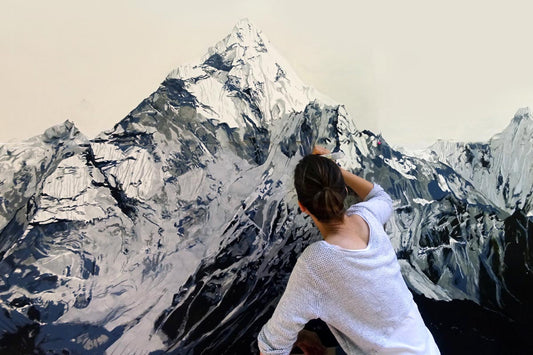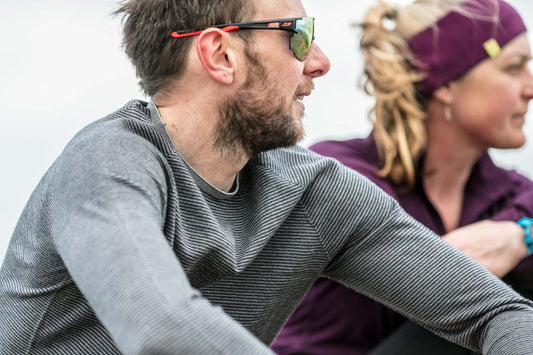Ross Brannigan recently set off from his home in Kendal to cycle to each of the sites cared for by the John Muir Trust: a ride of 1,000km to Glenridding, Glenlude, Schiehallion, Ben Nevis, Knoydart, Skye, Quinag and Sandwood Bay. The aim was to raise awareness of the value of wild places and showcase the people who work to protect them.
We caught up with Ross after his trip to find out why he chose to do this ride, and what he learnt from doing it.Hey Ross, tell everybody where are you based and what you do!
I now live in Kendal in the beautiful South Lake District, but I have spent almost my entire life living in and exploring Scotland.
I am a hill runner (though, now living in north-west England I am a ‘fell’ runner), cyclist, writer and editor. I currently work as the Engagement Officer for the John Muir Trust.

How long has the outdoors been a part of your life?
Since as long as I can remember, really. I have been very fortunate in my life to have grown up in a very outdoorsy family. While living in Clackmannanshire, I had the Ochil Hills on my doorstep and spent the best part of two decades walking or running around and over them.
While a lot of my school friends headed off to sunny beaches for holidays, we were sat on top of a freezing hilltop with a flask of tea and cheese sandwiches. You can see why I love it!

What has been your favourite trip or adventure?
I recently set off on my biggest trip yet – cycling to each of the sites cared for by the John Muir Trust from my front door. That meant cycling from Kendal to Glenridding, Glenlude, Schiehallion, Ben Nevis, Knoydart, Skye, Quinag and Sandwood Bay.



The whole trip was about 1,000km long and I was raising money for the John Muir Trust. It was just incredible. I had this moment when I reached Bà Bheinn and I went, “Wow! I just cycled here . . . from the Lake District!”
My main aim was to raise awareness of the value of wild places and why we should protect and enhance them, as well as showcasing the incredible people who work hard to make that possible. I met volunteers, staff and friends of the Trust who all had their own stories to tell about why they go into the outdoors and work to protect it.


Sadly, I had to stop on the penultimate day due to a nasty fever and stomach problems (something that put me in hospital not long before the trip!), so I had to make the hard decision to pause the trip in Ullapool.
I am really excited to go back and visit the final two sites – Quinag and Sandwood Bay. I was delighted to hit my £1,000 fundraising target, but I would love to see that go higher.
Is there anyone who inspired your love of the outdoors?
I find that, throughout my life, different people have inspired me about different aspects of the outdoors. My parents were instrumental in taking me to the hills; my Pops (grandad) showed me how to play in nature – climbing trees, making tools and such – as well as introducing me to wildlife; my colleagues at the Trust inspire me to think about our ecosystems and planet; and my partner teaches me to be mindful and enjoy the headspace.
The outdoors really does have something for everyone!

Do you find that being outside has a positive impact on your wellbeing and mental health?
Absolutely, without question. I do often wonder whether it is the outdoors itself or what I do in the outdoors that is beneficial. For instance, the rhythm of running over the hills is so captivating and relieving to me. Yet, I find so much pleasure in feeling a part of nature and coming across wildlife while I am out. Recently, I came across a huddle of leverets (baby hares), and it was such a joy! They are very cute.
What is it about running and cycling specifically that you love?
I love the fact that my own two feet or a bicycle can take me to such amazing places. I do like to push myself a bit outdoors, as I find that quite meditative. However, hill running, for me, is such a joyful activity. It’s like being a kid in an enormous playground – running through mud and heather, climbing big rocks, running fast downhill.
With cycling, I am now discovering where my bike can take me and the conversations I have when I am on it. My recent trip was so different, and I am still processing just what it meant.

When did you discover FINDRA?
I found FINDRA way back in the early days, before the menswear range was introduced. I was into mountain biking then and really liked what FINDRA was doing with natural fibres, as well as showcasing women doing cool things in the outdoors. When the men’s range launched and I got my first kit, I was really excited and started recommending FINDRA to everyone!
What’s the best piece of advice you’ve ever received?
It isn’t about the goal; it’s about the journey. And, sometimes, the summit isn’t the only way to enjoy a mountain.

What do you feel is the key motivational or inspirational message you would like to highlight to our followers that would inspire them to get outdoors more?
There is a lot of talk of furthest, fastest, hardest out there right now. Adventures are what you want them to be, and your aims can be varied and even self-centred. Go slow, take pictures, eat good food, speak to lots of people and enjoy yourself.
Adventures are also a chance for you to recognise that, as humans, we’re a part of nature, not apart from it. When you go outdoors, you are in your natural habitat, and we should do everything we can to protect it.
Thanks Ross and great to meet you!
BOOK OF THE WEEK
English Pastoral by James Rebanks
Ross picked The Living Mountain by Nan Shepherd, but as this has been chosen recently by other Journal contributors, we’ve instead selected English Pastorial by James Rebanks.

As a boy, James Rebanks's grandfather taught him to work the land the old way. Their family farm in the Lake District hills was part of an ancient agricultural landscape: a patchwork of crops and meadows, of pastures grazed with livestock, and hedgerows teeming with wildlife.
And yet, by the time James inherited the farm, it was barely recognisable. The men and women had vanished from the fields; the old stone barns had crumbled; the skies had emptied of birds and their wind-blown song.
English Pastoral is the story of an inheritance: one that affects us all. It tells of how rural landscapes around the world were brought close to collapse, and the age-old rhythms of work, weather, community and wild things were lost.
PODCAST OF THE WEEK
Radio Lento

The Radio Lento podcast presents weekly sound postcards from beautiful places. Including time besides a stream in the Welsh Hills, an empty beach at low tide, birdsong in the rain, May rain after daybreak – each is around thirty minutes long and truly magical. Listen on headphones and be transported!
www.radiolento.podbean.com
MUSIC OF THE WEEK
Life During Wartime (Live) by Talking Heads
David Byrne is legendary for his energetic performances and this from Los Angeles in 1983 is no exception. Taken from the from the 1979 Talking Heads album Music of Fear, this extraordinary performance is exhausting to watch!




